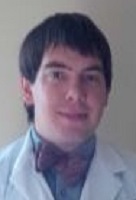
The term "food desert" is defined as an urban area in which it is difficult to buy affordable or quality fresh food. While people may not be surprised that Detroit at one time has been classified as a food desert, several of Detroit's suburbs have also received the same classification.
Nick Cook, a second-year student in Wayne State University School of Medicine's master's in public health program, knows that public health issues such as food deserts are not restricted to large urban areas but can extend to adjacent older suburbs. Cook recently completed a six-week externship to study public health issues in Macomb County, Michigan -- specifically Roseville, Eastpointe and Warren. He was selected as one of six WSU medical students to participate in the Bridges to Equity Program, a federally funded initiative designed to engage medical and public health students to work collaboratively on community-based projects to reduce health disparities.
For six weeks, Cook worked with staff at Michigan Area Health Education Center's Southeast Regional Center and the Greater Detroit Area Health Council in Detroit. He studied population health issues in Macomb County, including diabetes and lack of access to clinical care and healthy food. Cook and the other students will give a presentation about what they learned during their externships at 9 a.m. Oct. 2 at the WSU Department of Family Medicine and Public Health Science, located at 3939 Woodward Ave. in Detroit.
"While a large amount of my experiences have been in the greater-Detroit area, I think medical students and health professionals tend to simplify the situation by only using one approach to solve an issue or creating another organization to solve a problem such as obesity or access to healthy food options," Cook said. "Looking at the communities in Macomb County showed that each was unique and had its own assets, as well as problems. I learned that community-based organizations were already present in the area and working as a team called the Macomb County Partners in Health, which allowed for greater communication and partnerships between organizations. These partnerships will have a larger impact on clinical care, patient education, lifestyle changes, food access and more.
"One organization alone could not hope to fix all these problems, but a collaboration between health systems, corner stores, parks departments and pharmacies will leave a sustainable benefit to the health of the population of Macomb County," he added.
The externship was not Cook's first experience trying to improve public health. He is a board member of Raising Our Community's Knowledge, an organization founded by Wayne State University School of Medicine students. The group works to educate people in and around Detroit through interactive presentations about common health issues in the community.
Cook expects to graduate in 2018 with a medical degree and plans to specialize in hematology/oncology.
MI-AHEC is funded by the U.S. Health Resources and Services Administration and Wayne State University. Academic partners include Wayne State University's School of Medicine, College of Nursing, College of Pharmacy and Health Sciences, and School of Social Work; the University of Detroit Mercy School of Dentistry; Central Michigan University; Western Michigan University; and Northern Michigan University.